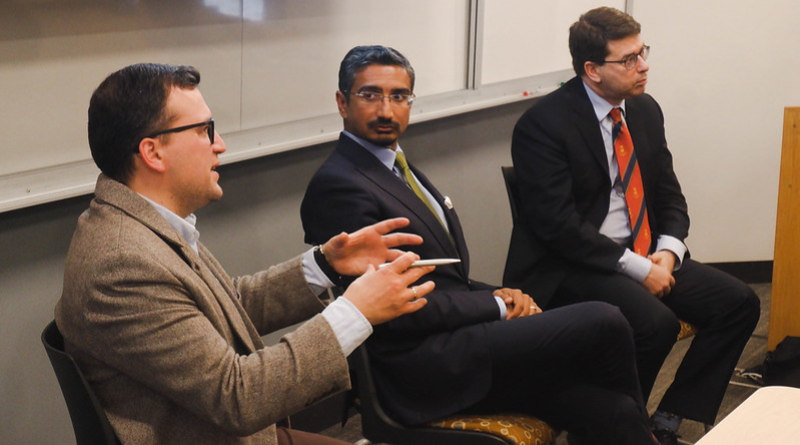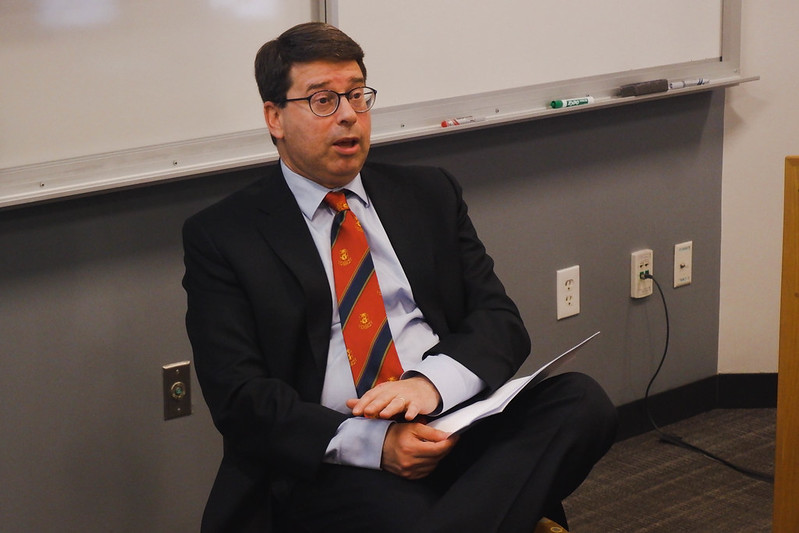Dhruva Jaishankar, Daniel Drezner, and Pavel Luzin Discuss Shifting Global Dynamics
By Vishal Manve, alumnus of The Fletcher School
On April 19, 2023, the Fletcher Russia and Eurasia Program and Fletcher South Asia Society (FSAS) hosted a panel discussion during Dhruva Jaishankar’s visit to campus. Renowned for his expertise in India’s foreign and security policy, Jaishankar serves as the Executive Director of Observer Research Foundation America (ORF America), a think tank addressing policy challenges involving the United States, India, and their partners. The panel also included visiting scholar Pavel Luzin, who specializes in Russian security affairs, and Professor Daniel Drezner, who moderated the conversation.
The conversation revolved around the shifting paradigms of polarity, norms, and choices in the context of emerging powers’ role in the evolving international order, with a specific focus on India’s strategic autonomy and its decision-making processes. It also delved into the implications of these factors for India’s positioning in the emerging global landscape as a counterbalance to China.
Prior to the session, Jaishankar visited Professor Chris Miller’s class on the history of Russia’s foreign policy to speak about how the destiny of the multipolar world hinged on the choices made by emerging powers like India and his forthcoming book on India-Russia relations. That was followed by the panel discussion with Luzin and Drezner.
Drezner kickstarted the session by discussing the relevance of the non-alignment movement globally. “The idea of being a non-aligned power, which India has proclaimed since its independence, has taken on a more significant meaning. If any of you have had a chance to peruse the latest issue of Foreign Affairs, you’ll notice that the cover story revolves around the concept of a non-aligned world. It’s a discussion about hedging in the realm of policy,” Drezner said.
He then spoke about an essay by Nirupama Rao, former Foreign Secretary of India, in which she discusses that “for India to strengthen itself and address global challenges, it has the prerogative to collaborate with a diverse array of partners.” Drezner noted that this perspective suggests that America’s criticism of India’s continued cooperation with Russia is none of America’s business.
Drezner further quoted Indian political scientist Pratap Bhanu Mehta, saying a key reason for the Global South’s refusal to take sides in the Russia-Ukraine war is the perception that the sanctions imposed on Russia are just as problematic as Russia’s invasion of Ukraine itself.
Drezner went on to say, “Europe’s problems are not necessarily the world’s problems.” He underscored the imperialist mindset implicit in expecting global alignment and noted India’s skillful departure from such expectations. Drezner pointed out the complexities of India’s foreign policy, citing the country’s membership in the Shanghai Cooperation Organization, being a founding member of BRICS, and its role in the non-aligned movement. However, he also raised the intriguing notion that as China’s influence grows, India has strategically engaged with the United States-led structures as a hedge against Beijing.
Drezner further delved into the evolving geopolitical dynamics, posing a thought-provoking question: “How long can a hedging strategy last?” He acknowledged India’s adeptness at this strategy so far but questioned its long-term sustainability. Drezner also questioned the validity of a purported polycentric world, suggesting that it might still be characterized by the dominance of the United States and China.
Ultimately, the focus of the conversation shifted to the crucial topic: Can India’s strategic agility and non-alignment principles persist in an evolving global order still deeply shaped by the pull of more powerful countries like the United States and China?
During his response, Jaishankar spoke about the repercussions of China’s ascension on a global scale, which spans from the Arctic to the Antarctic. Notably, he underlined the distinctiveness of China’s rise, being a party-backed economic powerhouse interwoven within the global supply chain and international investments.
Expressing his reservations, Jaishankar commented, “I am not a supporter of the term ‘polycentric world,’ as it seems more like a façade for describing a multipolar world. In the medium-term, India’s non-aligned stance has evolved.”
Touching upon China’s revisionist security approach, Jaishankar explained how even seemingly unrelated regions like Equatorial Guinea have become arenas for competition between the United States and China. He probed further into the issues of international lending, the law of the seas, and other emerging matters influenced by China’s rise and the U.S. response. Highlighting India’s shifting priorities, he noted, “India’s non-alignment has transformed. The most prominent challenge it faces is from China extending beyond borders to the Indian Ocean, trade affairs, and normative issues. Consequently, India is seeking equilibrium by engaging with the Quad countries, the EU, and Russia.”
As the discussion progressed, Drezner posed another thought-provoking question: “How can India leverage its diplomatic resources to bring an end to the Russia-Ukraine war?” In response, Jaishankar noted, “For Ukraine, this war holds existential importance, while for Putin, it’s a war of legacy. Hence, there’s limited appetite for truce negotiations.”
Instead, Jaishankar suggested potential avenues for India’s involvement, saying “India has the opportunity to employ its diplomatic channels to address specific emerging concerns, including ensuring the shipment of Ukrainian grains, preventing military attacks on nuclear installations, and actively participating in facilitating prisoner-of-war exchanges.”
Luzin also spoke about the practical aspects of Russia-India relations. “India’s historical partnership with Russia, particularly in trade, has deep roots extending back to the Soviet era. In the post-Soviet landscape, India has emerged as a significant consumer of Russian goods, notably in the field of arms,” Luzin said, highlighting how India’s first nuclear-powered submarine was from the Soviet Union in 1988. However, present-day Russia-India trade is experiencing a decline, even as India maintains a significant reliance on Russian arms exports, in contrast with China’s relatively limited involvement.
For India, Russia has played a role as a source of modernization and technological assistance, notably in sectors like space exploration, aircraft manufacturing, and shipbuilding. India has even become the primary producer of Russian-designed tanks. The interdependence also extends beyond military matters, as Russia relies on India’s pharmaceutical industry for critical chemical components crucial to Russia’s domestic medical requirements.
Despite this intricate relationship, India has also functioned as a strategic counterbalance for Russia, particularly in relation to China. In preceding years, India, Japan, and South Korea served as a counterweight to China’s influence. Russia’s pursuit of a balanced regional stance included fostering relations with China, Japan, South Korea, and India.
“Since February 2022, a shift has occurred, making India the exclusive counterbalance to China, elevating its strategic importance on the global stage,” Luzin concluded.
The event was co-organized by Ashutosh Patil, one of the student leaders of FSAS. When asked about the reasons for planning the event, Patil said, “The goal of organizing this panel discussion was to create a platform that transcended the boundaries of traditional academic discourse, enabling participants to delve into the complexities of India’s strategic choices in an evolving global landscape. Our main goal is to deepen the understanding of India’s complex socio-political landscape, its dynamic economy, and its diverse cultural fabric.”


